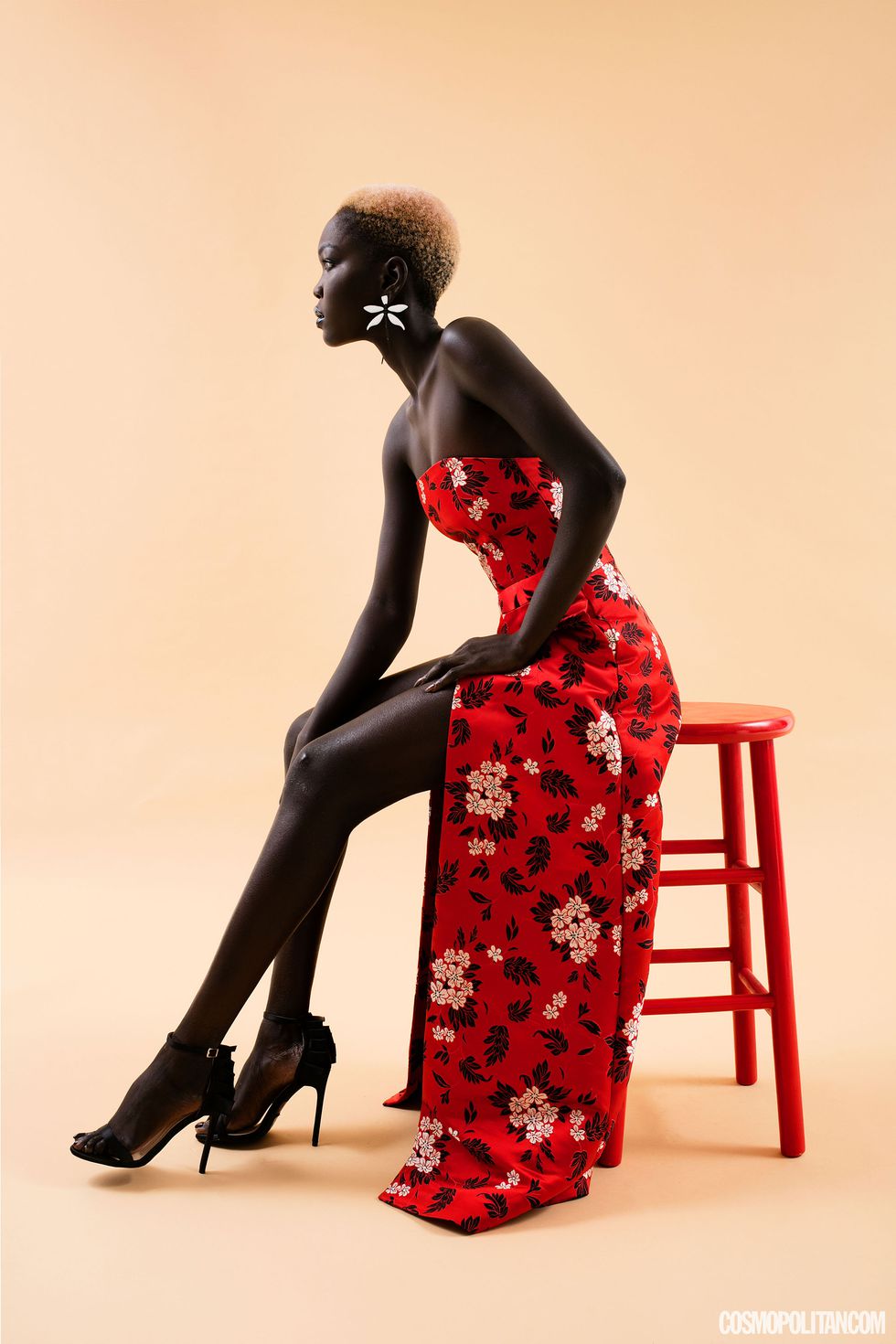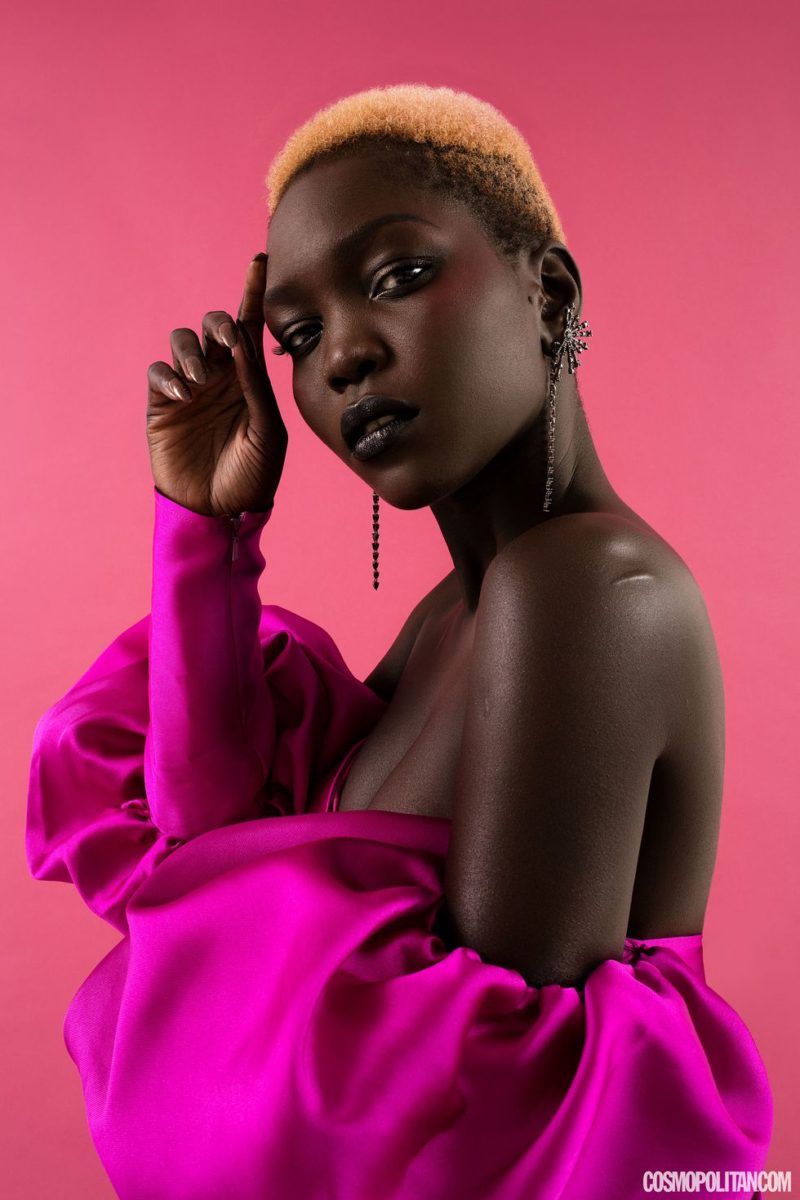Nyakim Gatwech moved to the US at the age of 14 under the most dire circumstances – she was a refugee who fled from her home country, Sudan. However, this misfortune did not deter her from dreaming big: She aspired to be a model.
These aspirations almost got shattered, as she got bullied in High School for being “too dark” and “ugly.” The incessant negative comments really affected her self-esteem for a while, causing her to want to dump her dreams.
But she persevered, and today, she is a succesful model. Nyakim, now 24 years old, recently spoke with Cosmopolitan about her journey to success. Here are excerpts from the interview:
What was your vision of America like when you arrived at age 14?
Oh, it was going to be like heaven. Living in a refugee camp [in Africa meant] sleeping in tents, not knowing where your dinner is coming from, not drinking clean water. America is education, food, hospitals, not feeling like your child will pass away because there’s no medical care. [But] you come here and realize you have to work hard for everything. Yeah, it’s not as heavenly as it seems, as it was made out to be back home. But at the end of the day, America is a really great country if you make it.
You haven’t always received positive reactions to your skin tone. You mentioned you were bullied by classmates when you moved to Buffalo, New York.
They would say, you know, I’m too black, my skin is too dark. They’d be like, “You don’t take showers. That’s why your skin is dirt.” Or, “Smile so we can see you, Nyakim. We can’t see you.” And then, in class, for example, the teacher would ask a question and say, “Oh, Nyakim, can you answer that?” A kid would say, “Who are you talking to? We can’t see her. She’s not here.” The whole class would start laughing, and I would just cry. The kid who would say that would go to the principal, or [he] would get in trouble. But the whole class was feeling what this kid was saying.
What were you thinking at the time?
I just kept to myself. I was like, “These people don’t accept me.” I was already having trouble with the language barrier and learning English to communicate with my teachers. I had always wanted to be a model, but after that I thought, “These kids think I’m ugly. I don’t see myself on social media, or TV, or in the magazines. I don’t think I’m meant to be a model.” I pushed that thought out of my head.
Did you ever consider bleaching your skin in the past?
At one point, I did consider it. When I came to America from a refugee camp in Africa [at age 14], I lived in Buffalo, New York. I would cry myself to sleep after being bullied [about my skin]. There are so many beautiful dark-skinned Sudanese women who bleach their skin. My own sister did it. But when I told her I wanted to [after living in America for a few months], she told me no. She said, “You would not just be bleaching your skin, you would be bleaching your mind. I did it and I regret it. I’m not going to let my daughter do it, or you — nobody.”
 Did the bullying continue when you moved to Minnesota later that year?
Did the bullying continue when you moved to Minnesota later that year?
I’d walk into the grocery store, and people would stare at me. I could hear people saying under their breath, “Oh my God, she’s so black. Is that even normal?” [To meet friends,] I tried joining sports — track and field. [My teammates would] say, “Are we going to be able to even see her when it’s her turn to pass the relay stick?” I quit track. I just kept to myself.
How do you react to online haters?
The negative reactions or comments don’t affect me as much now — some of them I laugh at. But there are some that go deep and bring me down for a little bit. Some people say I get followers because people feel bad for me, not because I’m actually beautiful. They say I’m the dumbest person ever. But there are millions more people who think I’m beautiful and give me positive feedback.
By sharing her experiences about people’s reactions to her dark skin, Nyakim, who is a part-time school teacher and part-time model, has amassed a huge following on Instagram. She has more than 300,000 followers, and and has booked professional gigs ranging from local magazine covers to national campaigns for brands like Aldo.
Read the entire interview here.
Photo Credit: Cosmopolitan/Ruben Chamorro

